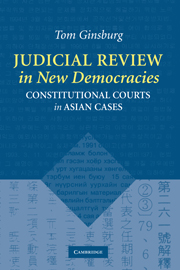Book contents
- Frontmatter
- Contents
- Acknowledgments
- Notes on Usage
- Judicial Review in New Democracies
- Introduction: The Decline and Fall of Parliamentary Sovereignty
- 1 Why Judicial Review?
- 2 Constituting Judicial Power
- 3 Building Judicial Power
- 4 Courts in New Democracies
- 5 Confucian Constitutionalism? The Grand Justices of the Republic of China
- 6 Distorting Democracy? The Constitutional Court of Mongolia
- 7 Rule by Law or Rule of Law? The Constitutional Court of Korea
- 8 Conclusion: Comparing Constitutional Courts
- Bibliography
- Index
1 - Why Judicial Review?
Published online by Cambridge University Press: 21 July 2009
- Frontmatter
- Contents
- Acknowledgments
- Notes on Usage
- Judicial Review in New Democracies
- Introduction: The Decline and Fall of Parliamentary Sovereignty
- 1 Why Judicial Review?
- 2 Constituting Judicial Power
- 3 Building Judicial Power
- 4 Courts in New Democracies
- 5 Confucian Constitutionalism? The Grand Justices of the Republic of China
- 6 Distorting Democracy? The Constitutional Court of Mongolia
- 7 Rule by Law or Rule of Law? The Constitutional Court of Korea
- 8 Conclusion: Comparing Constitutional Courts
- Bibliography
- Index
Summary
Modern scholarship on judicial review begins with the countermajoritarian difficulty. This famous problem focuses on the propriety of unelected judges, who lack democratic legitimacy, overturning duly enacted decisions of democratic assemblies. This normative challenge has been bolstered by theorists of democracy who argue that judicial power comes at the expense of representative institutions. Judicial review, from these perspectives, is not only unnecessary for democracy, but in fact suspect. In the face of these critiques, most legal scholars discussing judicial review have self-consciously adopted a defensive tone at the outset, trying to justify the role of courts in terms of democratic theory.
The conventional move to solve the problem of courts in democratic theory is to celebrate the role of judicial review in democracy as a check on majority power. Judicial review in this view can facilitate the democratic process by clearing out obstacles to its advancement. Such obstacles can emerge, for example, through majority impositions on the electoral process: It may be in the narrow self-interest of permanent majorities to disenfranchise political minorities, who then have no recourse through ordinary legislative processes. In such instances of systemic failure, the courts can clear the channels of the political process by striking statutes. By serving as a countermajoritarian institution, judicial review can ensure that minorities remain part of the system, bolster legitimacy, and save democracy from itself.
Several scholars have recently articulated a more majoritarian view of constitutionalism that emphasizes the need to empower rather than restrict majoritarian processes.
- Type
- Chapter
- Information
- Judicial Review in New DemocraciesConstitutional Courts in Asian Cases, pp. 21 - 33Publisher: Cambridge University PressPrint publication year: 2003
- 7
- Cited by



